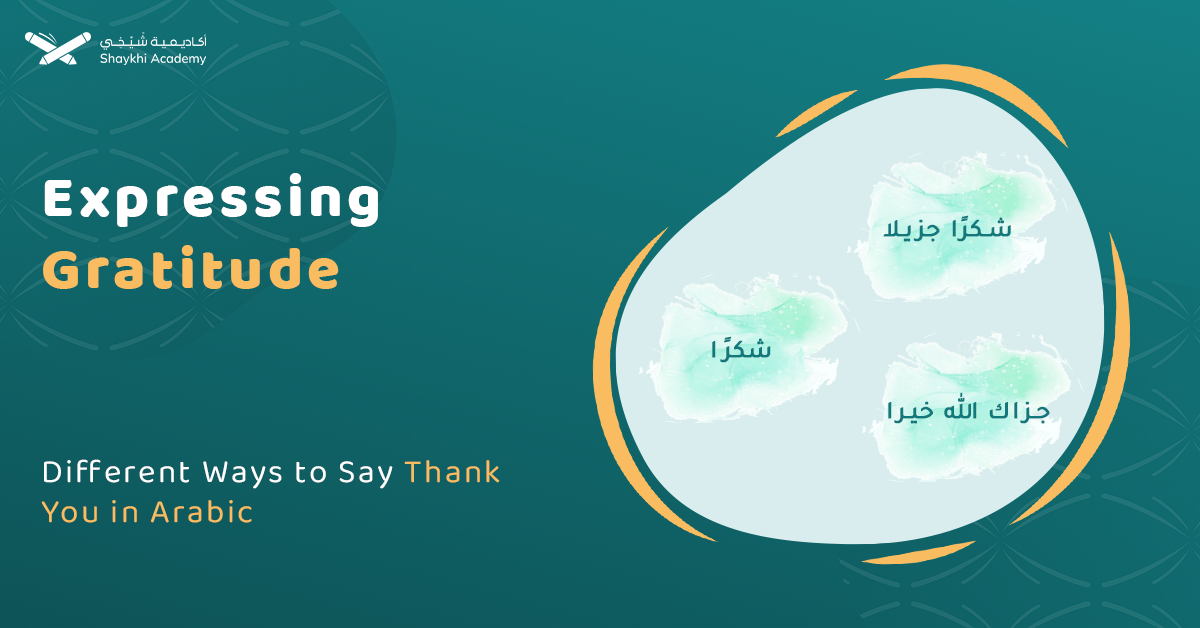In Arabic, expressing gratitude is more than just a polite gesture; it is a deeply ingrained cultural and religious practice. With a variety of phrases available, each one offers a different level of formality and warmth, allowing speakers to show their appreciation in ways that best fit the context. From the simple شكرًا (Shukran) to the heartfelt من كل قلبي (Min Kull Qalbi), these expressions help convey thanks in a manner that resonates with both the giver and the receiver.
This article seeks to explain the different ways to say “thank you” in Arabic which not only enriches communication but also fosters positive relationships across diverse settings.
Ways to Say Thank You in Arabic
In Arabic, there are many ways to express gratitude, each varying in formality and context: To learn many of these words and how to use them properly, one will need to learn the Arabic language:
| # | Arabic Phrase | Transliteration | Meaning |
| 1 | شكرًا | Shukran | The most common and general way to say “thank you.” |
| 2 | جزاك الله خيرًا | Jazak Allah Khairan | “May Allah reward you with good.” |
| 3 | ألف شكر | Alf Shukr | “A thousand thanks.” |
| 4 | مشكور | Mashkoor | “Grateful” or “thanked,” used to acknowledge effort. |
| 5 | بارك الله فيك | Barak Allah Feek | “May Allah bless you.” |
| 6 | شكراً جزيلاً | Shukran Jazeelan | “Thank you very much.” |
| 7 | تسلم | Tislam | “Bless you” or “Thank you” (informal). |
| 8 | أشكرك | Ashkurak | “I thank you.” |
| 9 | كل الشكر | Kull Al-Shukr | “All thanks” or “My utmost thanks.” |
| 10 | من كل قلبي | Min Kull Qalbi | “With all my heart” (a more heartfelt expression). |
Here are the details of each of them:
1. شكرًا (Shukran)
This is the most common and straightforward way to express gratitude in Arabic. It’s suitable for casual and formal settings, making it highly versatile.
Example:
شكرًا على مساعدتك لي اليوم.
Shukran ‘ala musaa’adatak lee alyawm.
“Thank you for helping me today.”
2. جزاك الله خيرًا (Jazak Allah Khairan)
This phrase has a religious connotation and is often used by Muslims to express gratitude while invoking a prayer for the recipient. It is commonly said when someone offers significant help or advice.
Example:
جزاك الله خيرًا على نصيحتك القيمة.
Jazak Allah Khairan ‘ala naseehatak al-qayyimah.
“May Allah reward you with goodness for your valuable advice.”
3. ألف شكر (Alf Shukr)
This phrase adds emphasis to the appreciation, showing an extra level of gratitude. It is often used to convey heartfelt thanks in both formal and informal situations.
Example:
ألف شكر على وقتك وجهودك.
Alf Shukr ‘ala waqtak wa juhoodak.
“A thousand thanks for your time and efforts.”
4. مشكور (Mashkoor)
This term acknowledges someone’s efforts in a concise and respectful manner. It is slightly less formal and works well in casual settings.
Example:
أنت مشكور على ما فعلته من أجلي.
Anta mashkoor ‘ala ma fa’altahu min ajli.
“You are thanked for what you did for me.”
5. بارك الله فيك (Barak Allah Feek)
This phrase combines gratitude with a prayer for blessings. It is often used to thank someone for their generosity or kindness.
Example:
بارك الله فيك على عطائك السخي.
Barak Allah Feek ‘ala ‘ataak as-sakhi.
“May Allah bless you for your generous giving.”
6. شكراً جزيلاً (Shukran Jazeelan)
This is an extended version of شكرًا, adding emphasis and making it more formal. It’s great for professional or polite interactions.
Example:
شكراً جزيلاً لتقديمك هذا التوضيح المفيد.
Shukran Jazeelan li-taqdeemak hatha at-tawdee’h al-mufeed.
“Thank you very much for providing this helpful clarification.”
7. تسلم (Tislam)
This informal phrase conveys gratitude in a warm and friendly manner. It is commonly used among friends and family.
Example:
تسلم على هذه الهدية الجميلة.
Tislam ‘ala hathihi al-hadiyyah al-jameelah.
“Bless you for this beautiful gift.”
8. أشكرك (Ashkurak)
This phrase is more formal and personal, often used in professional or respectful contexts to directly thank someone.
Example:
أشكرك على دعمك المستمر.
Ashkurak ‘ala da’mak al-mustamir.
“I thank you for your continuous support.”
9. كل الشكر (Kull Al-Shukr)
This phrase emphasizes the depth of gratitude, often used to convey utmost appreciation in formal or serious contexts.
Example:
كل الشكر لجهودك المخلصة.
Kull Al-Shukr li-juhoodak al-mukhlisah.
“All thanks for your sincere efforts.”
10. من كل قلبي (Min Kull Qalbi)
This heartfelt expression conveys deep, emotional gratitude. It is ideal for situations where sincerity and emotional connection are key.
Example:
أشكرك من كل قلبي على وقوفك بجانبي.
Ashkurak min kull qalbi ‘ala wuqoofak bi-janbi.
“I thank you from the bottom of my heart for standing by my side.”
Read more about: 40 Spanish Words from Arabic Origins
The Importance of Saying Thank You in Arabic
The act of showing gratitude is deeply embedded in Islamic teachings, where it is encouraged as a way of recognizing the kindness of others and promoting positive relationships. Many of the discussed words are culturally Islamic, which means they are taught in classical Arabic courses.
In this section, we will explore the various reasons why saying “thank you” in Arabic is of great importance, from strengthening bonds to reflecting sincerity and humility.
1. Fostering Positive Relationships
In Arabic-speaking cultures, expressing gratitude is an essential part of maintaining good relationships. Saying “thank you” helps build trust and respect between individuals, strengthening bonds in both personal and professional settings.
2. Reflecting Islamic Teachings
Gratitude is a core value in Islam, and thanking others is considered an act of piety. The Quran and Hadith encourage expressing appreciation for the kindness of others, which further emphasizes the cultural importance of saying “thank you” in Arabic.
3. Acknowledging Others’ Efforts
Saying “thank you” is a way to recognize the time, effort, and kindness of others. In Arabic, there are many ways to express this appreciation, from the simple شكرًا (Shukran) to more elaborate phrases, showing a deep sense of respect and acknowledgment.
4. Strengthening Social Bonds
Gratitude helps maintain social harmony and shows humility. By thanking others, individuals demonstrate their respect for the contributions and kindness of those around them, which strengthens social ties in both formal and informal contexts.
5. Conveying Sincerity and Respect
In Arabic, the variety of ways to say “thank you” allows individuals to express the depth of their appreciation. Whether it’s a casual تسلم (Tislam) or a heartfelt من كل قلبي (Min Kull Qalbi), the act of thanking conveys genuine respect and sincerity.
Read more about: 10 Ways to Say Goodbye in Arabic
Unlock the Beauty of the Classical Arabic Language!
Join Shaykhi Academy’s Classical Arabic Course and embark on a journey to master the language of the Quran and classical texts. Whether you’re a beginner or seeking to deepen your understanding, this course is tailored to help you gain fluency and confidence in reading, writing, and speaking Arabic.
Start your path to mastering Classical Arabic today—enroll now and transform your learning experience with expert guidance and proven methods!
Why Shaykhi Academy?
- Expert Native Tutors: Learn from highly qualified native Arabic speakers.
- Flexible Scheduling: Tailor your classes to fit your busy life.
- Affordable Learning: Access top-quality education at a price that suits you.
- Global Access: Study from anywhere in the world.
Explore Our Arabic Courses:
- Noorani Qaida: Build a strong foundation in Quranic Arabic.
- Comprehensive Arabic Courses: Master the Arabic language, from beginner to advanced levels.
- Fusha Arabic Classes: Delve into Modern Standard Arabic, the key to understanding literature, media, and formal communication across the Arab world.
- Quranic Arabic Course: Enhance your connection with the Quran by learning the language in which it was revealed.
Start Your Arabic Journey Today! Whether you’re just starting or looking to deepen your knowledge, Shaykhi Academy is here to support your journey. Book your free trial now and begin your path to Arabic mastery!

The Conclusion:
In conclusion, saying “thank you” in Arabic is far more than just a linguistic formality—it is an important expression of respect, sincerity, and gratitude. The variety of phrases allows speakers to adjust their level of appreciation depending on the context, while simultaneously reflecting the rich cultural and Islamic values that prioritize kindness and respect.
Whether it’s through a simple شكرًا or a more profound من كل قلبي, these expressions strengthen social bonds, promote humility, and reinforce the importance of acknowledging the efforts and kindness of others. Understanding and using these phrases appropriately can greatly enhance interactions and contribute to a harmonious, respectful atmosphere in Arabic-speaking communities.

















































